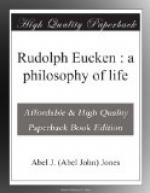Pantheism replies to the question by denying that there is anything high as distinguished from the low. There is but one; and that one—the whole universe—is God. There is no evil in the world, says pantheism, everything is good—if we could understand things as they really are we should find no oppositions in the universe, and no contradictions in the nature of things. The world as it is, is the best of all possible worlds—there is perfect harmony, though we fail to appreciate it. Other optimistic theories, too, deny the existence of evil and pain, and try to explain our ideas of sin to be mere “points of view.” If we could see the whole, they tell us, we should see how the parts harmonise, but now we only see some of the parts and fail to appreciate the harmony. In this way they try to explain away as unreal the phenomena of evil and pain.
But Eucken has no patience with such theories. For him the oppositions and contradictions of life are too real and persistent. The antagonisms “stir us with disgust and indignation.” Evil cannot be considered trivial, and must not be glossed over; it is in the world, and the more deeply we appreciate the fact the better it will be for the human soul.
Man in his lower stages of development is just a child of nature, and his standards of life are those of the lower world. He seeks those things that satisfy the senses, he attempts the satiation of the lower cravings. In the realm of morals his standard is utility—that is good which helps him to obtain more pleasure and to avoid pain. In social life his conduct is dictated by custom—this is the highest appeal. The development of man along the lines of nature ends at this point—and if nothing more is to happen, then he must remain at a low level of development. Matter and mind cannot take him beyond—the mind as such only helps towards the further satisfaction of the lower demands of man.
But there is something far greater in highly developed manhood than the petty and selfish. Man is capable of conceiving and adopting higher standards of morality than those of utility and pleasure, and it is the spiritual life that enables him to do this. It is the spiritual that frees the individual from the slavery of the sense world—from his selfishness and superficial interests—that teaches him to care less for the things of the flesh, and far more for the beautiful, the good, and the true, and that enables him to pursue high aims regardless of the fact that they may entail suffering and loss in other directions. This, then, is the “High” in the world; the natural life is the “Low.”




